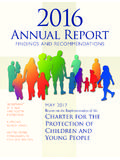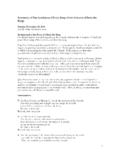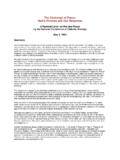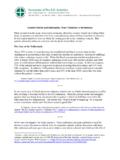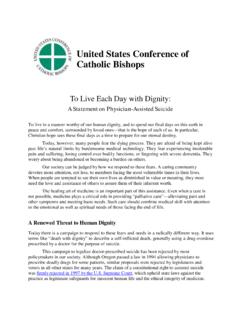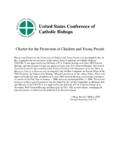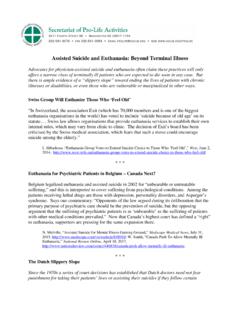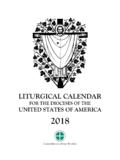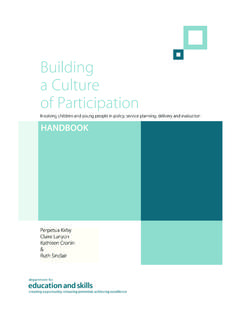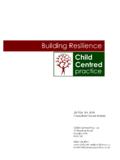Transcription of Building Cultural Competencies and the Call for a New ...
1 Building Cultural Competencies and the Call for a New Evangelization by Jesuit Fr. Allan Figueroa Deck, PhD, STD Associate Professor of Catholic and Latino Studies Casassa Chair of Catholic Social Values Loyola Marymount University, Los Angeles Framing the Question One of the most significant changes taking place in the world of catechesis and religious education over the last fifty years is the absolutely central role that competence in culture and intercultural relations plays in the world of catechesis. This is so because the Magisterium places catechesis squarely within the context of the Church s identity and mission to evangelize, which in turn focuses our attention precisely on the engagement of Christian faith with cultures.
2 What are we really doing when we preach and teach in the name of Christ? We are engaging culture and cultures. Culture is the target of the Church s evangelizing and catechizing mission, not merely an interesting or optional sidelight that we explore after having thoroughly mastered the content of catechesis and adopted appropriate methodologies. Pope John Paul II followed the lead of the Second Vatican Council, especially Gaudium et Spes and his predecessor Pope Paul VI s landmark pastoral exhortation Evangelii Nuntiandi. He spelled it out in clear terms in his apostolic exhortation Catechesi Tradendae: We can say of catechesis, as well as of evangelization in general, that it is called to bring the power of the Gospel into the very heart of culture and cultures.
3 For this purpose, catechesis will seek to know these cultures and their essential components; it will learn their most significant expressions; it will respect their particular values and riches (On Catechesis in Our Time [Catechesi Tradendae], no. 53, emphasis added, ). One lung, as it were, with which this catechetical vision breathes is the Gospel message itself and, more broadly, the entire Christian revelation as formulated in Sacred Scripture and Tradition. But the other lung is equally important, namely, the engagement of 2 the content of faith with people and specifically with the core of attitudes and ways of thinking and behaving that constitute culture in its deepest anthropological sense.
4 The Holy Father s reference to culture and cultures in the above quote is telling. He is referring to the fact that catechists are dealing not only with particular ethnic and national cultures, for example, the prevailing U. S. culture (elusive as that might be), the Asian and Pacific Islander, the Native American, the Haitian, the African American, or the Hispanic/Latino cultures, and so forth. Today s catechist, regardless of his or her area of specialization, must be conversant with today s dominant worldwide culture, that is, the culture of modern, secular societies like the United States.
5 The Church s urgent call for a New Evangelization depends on the response of catechists, teachers, and preachers not only to particular ethnic/national cultures, but also to the reality of a pervasive secularizing culture that is the paradigm for culture and for many others in an economically globalized and interdependent world. The Pew Research Center s recent studies on religious trends in the United States document the precipitous rise in the number of adults and especially young adults in the United States claiming to have no religion: 12 percent of adults and 24 percent of youth and young adults (see Pew Research Reports on Religion, ).
6 In formulating the Church s response to the challenge of secularism, a focus on catechetical literacy is certainly of extreme importance. A great deal of data is telling us that both younger and older generations of Catholics are woefully deficient in their ability to give an intelligent account of their faith and, more alarming, live up to its standards of conduct, such as participating in the Sunday Eucharist on a weekly basis and appropriating a consistent ethic of life on the issues of contraception, abortion, Christian marriage, immigration, capital punishment, and economic justice. The response to this challenge, however, should not be limited to merely proclaiming what the Church teaches and providing greater access to the formulations of the faith.
7 While zealous proclamation of the faith is always fundamental and access to rich resources like the Catechism of the Catholic Church and other handy aids adapted to adults or youth are essential, they are simply not enough. Perhaps Pope Benedict XVI was referring to this in his first encyclical, Spe Salvi, when he wrote: We have raised the question: can our encounter with the God who in Christ has shown us his face and opened his heart, be for us too not just informative but performative that is to say, can it change our lives, so that we know we are redeemed through the hope that it expresses?
8 (On Christian Hope [Spe Salvi], no. 4, ). The Holy Father s distinction between passing on information and the heavy lifting leading to that information really making a difference in how one concretely lives (the performative) directly relates to the central point of this essay: familiarity with culture and how it works together with knowledge, attitudes, and practical skills in intercultural encounters goes a long way toward bridging the gap between 3 catechesis as centered on content on the one hand and as leading to transformed lives on the other that is, effecting an ongoing Christian conversion.
9 Another way to say this is to remind ourselves that doctrinal soundness is never enough. Our mission is to make the sacred Revelation, the Christian message, become life. That is the heart of the matter! The Church today tells us that knowing practically how to engage culture and cultures is the key. Building Intercultural Competence for Catechists At their November 2011 meeting in Baltimore, the Committee on Cultural Diversity of the United States Conference of Catholic Bishops (USCCB) approved five guidelines for intercultural competence in ministry. They are quite relevant specifically to the catechetical ministry as understood in light of the Magisterium today: 1.
10 Frame issues of diversity theologically in terms of the Church s identity and mission to evangelize. 2. Seek an understanding of culture and how it works. 3. Develop intercultural communication skills in pastoral settings. 4. Expand one s knowledge of the obstacles which impede effective intercultural relations. 5. Foster ecclesial integration rather than assimilation in Church settings, with a spirituality of reconciliation and mission. (Go to ; click on the Diversity/Diversidad tab; select video Building Intercultural Competence for Ministers. ) These guidelines are not only relevant for every ecclesial ministry in light of the Magisterium s insistence on the centrality of culture and cultures as the target of all the Church s efforts to teach and preach, but they are also urgently needed in light of the practicalities of what is happening on the ground in the United States today.
